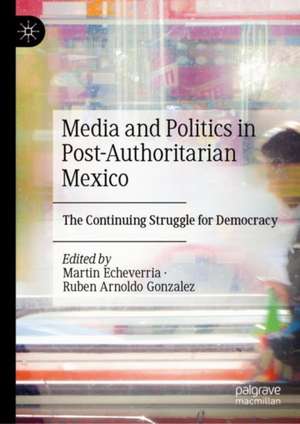Media and Politics in Post-Authoritarian Mexico: The Continuing Struggle for Democracy
Editat de Martin Echeverria, Ruben Arnoldo Gonzalezen Limba Engleză Hardback – dec 2023
This is analyzed from three points of view: the stalemate Mexican media system and ineffective regulations, the conditions of risk and insecurity of the journalists on the field, and the limits of freedom of expression, political substance, and inclusiveness of media content.
A binational effort, with research from US and Mexican authors, a wide analytic perspective is provided on the macro, meso, and micro levels, allowing for a deep conceptual richness and a comprehensive understanding of the Mexican case. With leading researchers in the field, the volume revolves around the problems of the media in post-authoritarian democracies.
By answering the questions of how and why the Mexican media has not fully democratized, the works encompassed here can resonate with and are relevant to other post-authoritarian countries and academic disciplines.
Preț: 893.40 lei
Preț vechi: 1089.51 lei
-18% Nou
Puncte Express: 1340
Preț estimativ în valută:
170.97€ • 177.48$ • 142.56£
170.97€ • 177.48$ • 142.56£
Carte tipărită la comandă
Livrare economică 24 martie-07 aprilie
Preluare comenzi: 021 569.72.76
Specificații
ISBN-13: 9783031364402
ISBN-10: 3031364406
Pagini: 286
Ilustrații: XIII, 286 p. 3 illus., 2 illus. in color.
Dimensiuni: 148 x 210 mm
Greutate: 0.51 kg
Ediția:1st ed. 2024
Editura: Springer International Publishing
Colecția Palgrave Macmillan
Locul publicării:Cham, Switzerland
ISBN-10: 3031364406
Pagini: 286
Ilustrații: XIII, 286 p. 3 illus., 2 illus. in color.
Dimensiuni: 148 x 210 mm
Greutate: 0.51 kg
Ediția:1st ed. 2024
Editura: Springer International Publishing
Colecția Palgrave Macmillan
Locul publicării:Cham, Switzerland
Cuprins
1. Introduction. Not Authoritarian, but Not Yet Democratic: the Mexican authoritarian legacies in media and politics. Volume editors.- Part 1. Media Systems, Regulation and Historical Antecedents: Explaining Continuities.- 2. Media Systems in Unconsolidated Democracies: the case of Mexico. Manuel Alejandro Guerrero.- 3. Challenges in Protecting Freedom of Expression in Mexico: 20 years of progress with poor results. Salvador de Leon Vazquez..- 4. The Salinas Years, 1988-1994: Watershed in the opening of Mexico's print media?. Andrew Paxman.- Part 2. The Burden of Being a Journalist in Mexico: Risk, Security and Censorship.- 5. Surviving Mexico's Peripheries: limits and constraints among journalists in the Twenty-First Century. Celeste Gonzalez de Bustamente & Jeannine Relly.- 6. Still Dreaming of Democracy: How professional norms from the political opening shape risk and resilience today. Sallie Hughes.- 7. Defective Democracy, Erosion of Freedom of Press, and the Perils of Being a Journalist in Mexico Two Decades After the Democratic Transition. Ruben Arnoldo Gonzalez, Osiris S. Gonzales-Galvan.- 8. AMLO and Freedom of the Press: The struggle between conflicting visions of communicative strategies in Mexico. Stuart Davis & Melissa Santillana.- Part 3. Post-Authoritarian Media Performance: Actors and Representations in Dispute.- 9. Mediatization in post-authoritarian democracies: 20 years of media logic in Mexican press. Martin Echeverria.- 10. Press and Civil Society: Alliance and mistrust in Mexican transition to democracy. Grisel Salazar.- 11. Television Political Satire and the Mexican Democratic Transition. Frida V. Rodelo.
Notă biografică
Martin Echeverria is Full-Professor at the Centre for Studies in Political Communication, Institute of Government Sciences and Strategic Development, Benemerita Universidad Autonoma de Puebla, Mexico.
Ruben Arnoldo Gonzalez is Full-Professor at the Centre for Studies in Political Communication, Institute of Government Sciences and Strategic Development, Benemerita Universidad Autonoma de Puebla, Mexico.
Ruben Arnoldo Gonzalez is Full-Professor at the Centre for Studies in Political Communication, Institute of Government Sciences and Strategic Development, Benemerita Universidad Autonoma de Puebla, Mexico.
Textul de pe ultima copertă
This volume presents an analytical and empirical overview of the array of issues that the Mexican media faces in the post-authoritarian age, which jointly explains how a partially accomplished democracy, its authoritarian inertias, and its unintended consequences hinder the democratic performance of the media.
This is analyzed from three points of view: the stalemate Mexican media system and ineffective regulations, the conditions of risk and insecurity of the journalists on the field, and the limits of freedom of expression, political substance, and inclusiveness of media content.
A binational effort, with research from US and Mexican authors, a wide analytic perspective is provided on the macro, meso, and micro levels, allowing for a deep conceptual richness and a comprehensive understanding of the Mexican case. With leading researchers in the field, the volume revolves around the problems of the media in post-authoritarian democracies.
By answering the questions of howand why the Mexican media has not fully democratized, the works encompassed here can resonate with and are relevant to other post-authoritarian countries and academic disciplines.
Martin Echeverria is Full-Professor at the Centre for Studies in Political Communication, Institute of Government Sciences and Strategic Development, Benemerita Universidad Autonoma de Puebla, Mexico.
Ruben Arnoldo Gonzalez is Full-Professor at the Centre for Studies in Political Communication, Institute of Government Sciences and Strategic Development, Benemerita Universidad Autonoma de Puebla, Mexico.
A binational effort, with research from US and Mexican authors, a wide analytic perspective is provided on the macro, meso, and micro levels, allowing for a deep conceptual richness and a comprehensive understanding of the Mexican case. With leading researchers in the field, the volume revolves around the problems of the media in post-authoritarian democracies.
By answering the questions of howand why the Mexican media has not fully democratized, the works encompassed here can resonate with and are relevant to other post-authoritarian countries and academic disciplines.
Martin Echeverria is Full-Professor at the Centre for Studies in Political Communication, Institute of Government Sciences and Strategic Development, Benemerita Universidad Autonoma de Puebla, Mexico.
Ruben Arnoldo Gonzalez is Full-Professor at the Centre for Studies in Political Communication, Institute of Government Sciences and Strategic Development, Benemerita Universidad Autonoma de Puebla, Mexico.
Caracteristici
Provides comprehensive analysis on why Mexican media has not fully democratized Provides a binational and wide analytical scope with leading Mexican and American scholars Covers media systems, journalistic risks, and the role of entertainment and civil society
